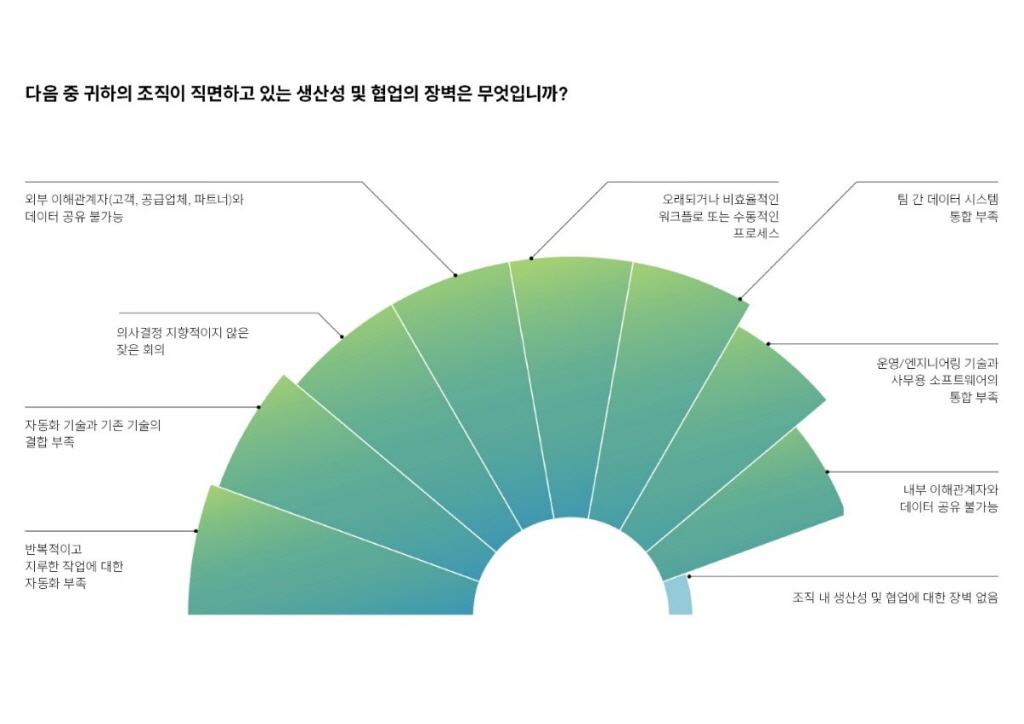센서, 소프트웨어, 자율 기술을 결합한 디지털 리얼리티 솔루션 분야의 글로벌 리더, 헥사곤 매뉴팩처링 인텔리전스(Hexagon Manufacturing Intelligence)가 제조업체 중 98%가 데이터 문제로 인해 협업 및 생산성 향상에 어려움을 겪고, 고객의 요구사항에 대응하는 시간이 지연되어 비즈니스 목표 달성에 실패할 위험이 있다고 밝혔다.
데이터 가용성·품질 문제, 발전된 기술 도입 저해·협업 문제
제조업체 40% 자동화 후발주자, 경쟁업체 뒤처질 위험 직면
.jpg)
센서, 소프트웨어, 자율 기술을 결합한 디지털 리얼리티 솔루션 분야의 글로벌 리더, 헥사곤 매뉴팩처링 인텔리전스(Hexagon Manufacturing Intelligence)가 제조업체 중 98%가 데이터 문제로 인해 협업 및 생산성 향상에 어려움을 겪고, 고객의 요구사항에 대응하는 시간이 지연되어 비즈니스 목표 달성에 실패할 위험이 있다고 밝혔다.
헥사곤은 최근 ‘글로벌 첨단제조산업보고서(Advanced Manufacturing Report)를 발표했다.
포레스터 컨설팅(Forrester Consulting)에 의뢰해 발간된 이번 보고서는 고부가가치 제품의 디자인과 제조에 근본적인 변화를 가져온 3가지의 디지털 전환 촉매로 △데이터 품질과 활용 가능성 △조직 내 협업 및 자율적 권한 부여 △자동화를 뽑았다.
헥사곤은 최고경영자를 포함한 전 세계 500명의 제조업계 리더를 대상으로 한 디자인, 완제품 및 품질 관리까지 전체 가치사슬을 아우르는 글로벌 조사 연구를 기반으로 제조업계의 트렌드, 리더들이 직면하는 도전과제, 성공 사례와 새로운 기회에 대한 인사이트를 보고서에 담았다.
보고서에 따르면 대다수의 비즈니스 리더는 협업이 개선될 경우 제품 품질 개선과 시장 출시 기간을 단축할 수 있다고 보고, 디자인팀과 제조팀 간의 커뮤니케이션을 개선해 자재 낭비와 유해물질 배출량을 크게 줄이는 등 지속가능성을 높일 수 있다고 응답했다.
이처럼 기업 내 데이터 통합을 통한 협업환경 개선에 대한 필요성이 증가했음에도 불구하고, 비즈니스 리더의 71%는 설계팀과 제조팀 간의 시너지 부족을 우려하고 있다.
조쉬 와이즈(Josh Weiss) 헥사곤 매뉴팩처링 인텔리전스 사장은 “제조업에서 유래된 자동화와 애자일 방식이 다른 산업군의 비즈니스 혁신을 주도하고 있는 반면, 제조업 공정 전반에 걸친 디지털화는 혁신이 지체되고 있다는 게 아이러니하다”며 “디지털 트윈 기술은 스마트 팩토리를 구축하고, 부서 간 문제를 혁신적으로 해결하고, 고품질의 데이터를 통해 생산성을 향상시킨다. 조직의 데이터 사용 역량을 강화하는 것은 보다 효율적인 가치 창출을 추진하고 시장 상황에 민첩하게 대응해 제품의 출시 기간을 단축할 수 있는 기반이다. 예시로, 중국의 전기차 업체 비야디(BYD)는 제조 가치 사슬 전반에 걸쳐 생산성을 향상하고 혁신적인 변화를 통해 테슬라(Tesla)를 제치고 전기차 시장의 선두주자로 부상하며 자동차 업계를 뒤흔들고 있다”고 말했다.
제조업체의 2%만이 자사의 데이터 흐름에 문제가 없다고 답한 가운데, 대다수의 기업은 디지털화를 성공적으로 이루기 위한 조직 전반의 문화적, 기술적 변화를 통한 조치를 취하지 않으면 비즈니스 목표를 달성에 실패할 위험이 있다.
리더들은 향후 3년간의 최우선 비즈니스 과제로 운영 효율성 향상, 제조 생산량 증대, 신제품의 빠른 품질 개선을 꼽았다.
제조업체의 37%는 제조 공정의 어느 단계도 고도화 또는 완전 자동화하지 못한 후발업체로, 경쟁업체에 뒤처지고 있다.
반면에 제조 공정의 2단계 이상을 자동화한 기업은 직원 생산성과 효율성에서 뚜렷한 우위를 점하고 인재 부족 문제도 효과적으로 해소한 것으로 나타났다.
자동화를 중점 추진한 기업의 리더 중 58%는 직원 생산성 및 혁신이 증가했다고 답했으며 39%는 인력 부족 문제를 효과적으로 해결했다고 답했다.
반면에 후발업체는 리더의 35%만이 생산성 및 혁신이 증가했다고 답했으며 26%가 인력 부족 문제를 효과적으로 해결했다고 답했다.
전 세계 제조업체들은 생산성 향상을 위해 첨단 자동화 기술을 도입하는 가운데 특히 아시아의 제조기업들은 시뮬레이션, 가상 제조, 유지보수 예측 등을 통해 재정적 영향이 심각할 수 있는 다운스트림 문제를 예방하는 등 데이터를 더욱 적극적으로 활용하고 있는 것으로 나타났다.
나아가 아시아 기업의 58%가 향후 3년 동안 AI 기반 혹은 생성형 자동화에 투자할 계획이라고 답했지만, 북미(45%), 유럽, 중동 및 아프리카(38%)의 제조업체는 절반 이하의 기업만이 투자 계획이 있다고 밝혔다.
헥사곤의 글로벌 첨단제조산업보고서는 미국, 캐나다, 영국, 독일, 프랑스 등 전 세계 9개국의 제조업계 리더를 대상으로 조사를 진행하고 분석 결과를 담았으며, 보고서 전문은 헥사곤의 웹사이트에서 살펴볼 수 있다.
한편 헥사곤은 국내 제조업체의 데이터 사일로화를 해결하고 자동화를 구축하기 위해 다양한 솔루션과 플랫폼을 제공하고 있다.
넥서스(Nexus)와 AI툴 오딧세이(ODYSSEE)를 통해 클라우드 기술과 AI 및 머신러닝을 활용하여 제품 개발 주기와 비용을 단축하고, 자율이동로봇(AMR)과 헥사곤의 솔루션을 결합하여 국내 제조업체의 생산성 향상과 자동화 도입을 적극 지원하고 있다.
.jpg) 센서, 소프트웨어, 자율 기술을 결합한 디지털 리얼리티 솔루션 분야의 글로벌 리더, 헥사곤 매뉴팩처링 인텔리전스(Hexagon Manufacturing Intelligence)가 제조업체 중 98%가 데이터 문제로 인해 협업 및 생산성 향상에 어려움을 겪고, 고객의 요구사항에 대응하는 시간이 지연되어 비즈니스 목표 달성에 실패할 위험이 있다고 밝혔다.
센서, 소프트웨어, 자율 기술을 결합한 디지털 리얼리티 솔루션 분야의 글로벌 리더, 헥사곤 매뉴팩처링 인텔리전스(Hexagon Manufacturing Intelligence)가 제조업체 중 98%가 데이터 문제로 인해 협업 및 생산성 향상에 어려움을 겪고, 고객의 요구사항에 대응하는 시간이 지연되어 비즈니스 목표 달성에 실패할 위험이 있다고 밝혔다.